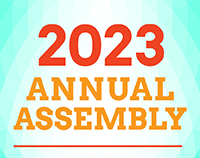
Assembly Highlight - Embracing Uncertainty: The Role of Narrative in Decision-Making for Children with Medical Complexity
*This recording is repurposed from the 2023 Annual Assembly
Children with medical complexity (CMC), who have chronic conditions, high healthcare utilization, and use medical technology, are increasingly being referred to palliative care for decision support. However, their complexity creates a decision-making paradox: we make decisions by choosing between imagined futures, but the defining characteristic of complex systems is the unpredictability of future outcomes. How do we help families navigate decisions when we are unable to confidently predict what might happen with different options? Anchored by a case about a family deciding about scoliosis surgery for their daughter with severe neurologic impairment, this session will integrate ideas from psychology and business to describe the use of narrative as a decision-making tool.
Pre-decision narratives can facilitate conversations about the influence of complexity on outcomes and can help families intentionally craft their own post-decision narrative before the decision is made. Clinicians can use post-decision narrative before the decision to identify their own blind spots, which may enhance their cultural humility. Many of these strategies are used intuitively by expert clinicians—this session provides a framework so that they can be wielded more intentionally and explained to learners. Though discussed with a pediatric lens, introduced concepts are applicable across the lifespan.
Target Audience
Hospice Medical Directors
HPM Physicians
Nurses
Nurse Practitioners
Pharmacists
PAs
Learning Outcomes
1. Recognize how complexity influences decision making.
2. Utilize pre- and post-decision narratives as decision-making tools to identify bias, to reflect with families about uncertainty, and to help families create their own narrative for future reflection
Disclosures
AAHPM endorses the Accreditation Council for Continuing Medical Education (ACCME) Standards for disclosure and commercial support and endeavors to ensure balance, independence, objectivity, and scientific rigor for all accredited products or programs. All who are in a position to control or influence the content of an educational activity must disclose any relevant financial relationships with ineligible companies.*Disclosure documents were reviewed for potential conflicts of interest and, if identified, were resolved prior to confirmation of participation. Only those who had no conflict of interest or who agreed to an identified resolution process prior to their participation were involved in this activity.
All editors, faculty and staff have disclosed no relevant financial relationships.
*An ineligible company is defined as any entity producing, marketing, reselling, or distributing healthcare goods or services consumed by, or used on, patients.
Faculty
Kate Nelson, MD PhD
Staff
Leah Farfan, BA
Julie Tanner, BSN RN-BC CHPN
Angie Tryfonopoulos, BS
Theresa Nissen, BA
Laura Witt, MS-HSM
Julie Bruno, MSW LCSW
This recorded activity is a non-accredited learning resource. No CME or MOC is offered with this activity.

 Facebook
Facebook X
X LinkedIn
LinkedIn Forward
Forward